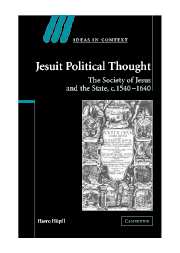Book contents
- Front Matter
- Contents
- Acknowledgements
- List of abbreviations
- Translations, references, and orthography
- Introduction
- 1 The character of the Society of Jesus
- 2 The Society's organisational ideas
- 3 The Society and political matters
- 4 The Church, the Society, and heresy
- 5 The confrontation with reason of state
- 6 Reason of state and religious uniformity
- 7 Jesuit reason of state and fides
- 8 Reason of state, prudence, and the academic curriculum
- 9 The theory of political authority
- 10 Limited government, compacts, and states of nature
- 11 The theory of law
- 12 The common good and individual rights
- 13 Tyrannicide, the Oath of Allegiance controversy, and the assassination of Henri IV
- 14 The papal potestas indirecta
- Conclusion
- Bibliography
- Index
- IDEAS IN CONTEXT
13 - Tyrannicide, the Oath of Allegiance controversy, and the assassination of Henri IV
Published online by Cambridge University Press: 22 September 2009
- Front Matter
- Contents
- Acknowledgements
- List of abbreviations
- Translations, references, and orthography
- Introduction
- 1 The character of the Society of Jesus
- 2 The Society's organisational ideas
- 3 The Society and political matters
- 4 The Church, the Society, and heresy
- 5 The confrontation with reason of state
- 6 Reason of state and religious uniformity
- 7 Jesuit reason of state and fides
- 8 Reason of state, prudence, and the academic curriculum
- 9 The theory of political authority
- 10 Limited government, compacts, and states of nature
- 11 The theory of law
- 12 The common good and individual rights
- 13 Tyrannicide, the Oath of Allegiance controversy, and the assassination of Henri IV
- 14 The papal potestas indirecta
- Conclusion
- Bibliography
- Index
- IDEAS IN CONTEXT
Summary
In view of the Society's over-riding preoccupation with principatus and its tender solicitude for princes, it is surprising that Jesuits of all people should have been particularly associated in the political polemic of the time with that most potentially anarchic of all the remedies for tyranny, namely tyrannicide. As we have seen, they hardly needed reminding that one man's tyranny is another's smack of firm government. And in all except the most outrageous cases, their presumption was always in favour of obedience to rulers: in dubio praesumendum est pro Superiore, et obediendum illi est.
The main reason Jesuits discussed tyrannicide at all was because, strange as it may seem, it was a perfectly standard topic in text-books on theology and law; it sometimes even figured in cases of conscience. Suárez cited nineteen scholastic sources, theologians, civilians, and canonists, of whom only three were Jesuits (Toledo, Azor, and Molina). Aquinas himself had referred to the matter in at least three places: De regimine principum, I, ch. II, 6–10; 2a.2ae, qu. 64, art. 3, and Commentary on Sentences II, dist. 44, qu. 2, art. 2, ad 5. But the scholastic locus classicus was Bartolus of Sassoferrato, Tractatus de Guelphis et Ghibellinis. Scholars were well aware of opinions favourable to tyrannicide in antiquity, as with Cicero's verdict on Brutus and Cassius slaying Caesar.
- Type
- Chapter
- Information
- Jesuit Political ThoughtThe Society of Jesus and the State, c.1540–1630, pp. 314 - 338Publisher: Cambridge University PressPrint publication year: 2004
- 1
- Cited by



